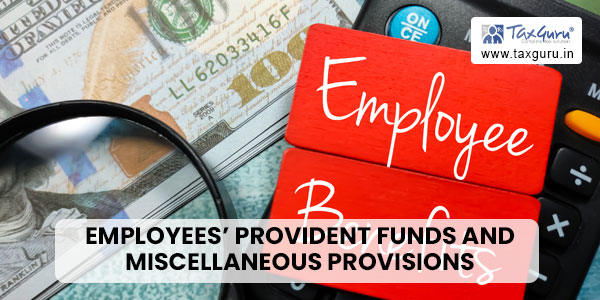The Employees’ Provident Funds and Miscellaneous Provisions Act, 1952, is a crucial legislation in India that provides social security benefits to workers. Applicable to establishments with 20 or more employees, the act mandates a 12% monthly contribution from both employers and employees to the provident fund. Managed by the Employee’s Provident Fund Organization (EPFO), the funds provide financial security during retirement or unemployment due to certain circumstances. The act covers various establishments, ensuring financial stability for employees. Compliance is essential for employers, and the act fosters a responsible approach towards timely contributions, reducing the risk of fraud. Overall, the act plays a pivotal role in ensuring social security for employees, creating a financial safety net for the future.
The Employees’ Provident Funds and Miscellaneous Provisions Act, 1952, is an important piece of legislation that provides workers with a safety net against financial insecurity. It was enacted to provide social security benefits to employees working in establishments covered under the Act, as well as their families. This article will explain the provisions of this act, who it applies to, how it works, and its implications for employers and employees alike.

Page Contents
What is the Employees’ Provident Funds and Miscellaneous Provisions Act (EPF & MP Act)?
The Employees’ Provident Funds and Miscellaneous Provisions Act, 1952, is a piece of legislation enacted by the Indian parliament to provide social security benefits to employees. The act applies to any establishment that employs 20 or more workers in India. It provides for the creation of a provident fund account where employers are required to deposit 12% of their employees’ salary every month towards this fund. This money can be used by an employee upon retirement or if they become unemployed due to certain circumstances such as illness, injury, etc.
The act also provides for other benefits like gratuity payments at retirement based on years of service and pension funds for continuous employment exceeding 10 years. In addition, it allows for withdrawal from these accounts under special circumstances like marriage expenses or medical treatment costs.
Who does the EPF & MP Act apply to?
The EPF & MP Act applies mainly to establishments with 20 or more workers, including those employed in factories, mines, plantations, shops, hotels and restaurants, as well as government offices and local authorities within India. All salaried employees earning up to Rs 15,000/- per month are eligible under this law, regardless of whether they are permanent or temporary staff members working in establishments covered under the act.
How does EPF & MP work?
Under this law, both employers and employees contribute 12% each every month towards their provident fund account, which is managed by an agency known as the Employee’s Provident Fund Organization (EPFO). Employers have the responsibility of remitting contributions made by them, while employees need only submit proof of income while filing annual returns with EPFO once a year through Form 5-A, available online on its website. Once contributions have been made into an employee’s PF account, interest accrues annually at 8.5%. Additionally, employers should ensure compliance with all applicable laws related to labor welfare, such as payment of wages/salaries timely, etc., otherwise, there could be penalties imposed for non-compliance.
What are some implications associated with EPF & MP?
Implications associated with EPF & MP include financial security for both employers and employees alike during times when jobs may not be secure due to uncertain economic conditions or health issues resulting from prolonged sickness, among other reasons. By creating a corpus out of monthly deductions from salaries, it ensures that individuals do not suffer financially after retirement since they will receive regular payments until death, even if no other sources exist. Furthermore, upon leaving an organization prior to completing 3 years, 25% of the amount saved can be withdrawn directly without seeking permission, thus providing flexibility when needed most during tough times such as the financial crisis faced recently during the COVID-19 outbreak. Moreover, the statutory requirement around timely deposits into PF accounts ensures a responsible attitude among organizations regarding their commitment towards paying dues promptly, thereby reducing chances of fraud or misappropriation, especially in public sector companies, which tend to show laxity sometimes due to a lack of proper internal controls.
In conclusion, the Employees’ Provident Funds and Miscellaneous Provisions Act, 1952, is an important piece of legislation that provides workers with a safety net against financial insecurity. It allows for the creation of a provident fund account where employers are required to deposit 12% of their employees’ salary every month towards this fund, which can be used by them upon retirement or in case they become unemployed due to certain circumstances like illness or injury. The act applies mainly to establishments with 20 or more workers, including those employed in factories, mines, plantations, shops, hotels, and restaurants, as well as government offices and local authorities within India. By creating a corpus out of monthly deductions from salaries, it ensures that individuals do not suffer financially after retirement since they will receive regular payments until death, even if no other sources exist. Thus, the EPF & MP act has been instrumental in providing social security benefits to employees over decades now and will continue to remain so going ahead too.




